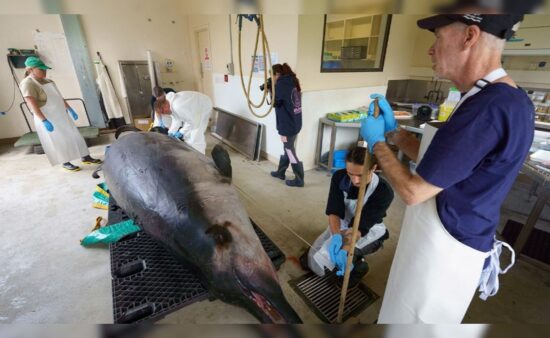
Wellington, New Zealand:
New Zealand scientists on Monday started dissecting a whale thought-about the rarest on the earth, a species so elusive that solely seven specimens have ever been documented.
The useless spade-toothed whale washed ashore on New Zealand’s South Island earlier this 12 months, providing an opportunity to check a deep-sea mammal that has by no means been seen alive.
Measuring 5 metres (16.4 ft) lengthy, the whale was winched off the seaside in July and has sat in a particular freezer since.
Whale skilled Anton van Helden mentioned it was the primary time scientists had been in a position to dissect a whole spade-toothed specimen, which belongs to the household of beaked whales.
“It is a outstanding and globally important alternative,” he mentioned.
The week-long dissection will assist to fill in gaps concerning the whale’s behaviour, its weight loss program, and even its fundamental anatomy.
“Beaked whales are probably the most enigmatic group of huge mammals on the planet,” mentioned Van Helden.
“They’re deep divers which can be hardly ever seen at sea, which presents actual challenges for researching these marine animals.
“This one is the rarest of the uncommon — solely the seventh specimen recognized from wherever on the earth, and the primary alternative we have now needed to undertake a dissection like this.”
New Zealand’s conservation division mentioned the spade-toothed whale was the “rarest whale on the earth”.
The species was first described in 1874 from only a decrease jaw and two enamel collected from the Chatham Islands off the east coast of New Zealand.
That pattern, together with skeletal stays of two different specimens present in New Zealand and Chile, enabled scientists to substantiate a brand new species.
As a result of so few specimens have been discovered and there have been no reside sightings, the spade-toothed whale is classed as “information poor” beneath the New Zealand Menace Classification System.
(Aside from the headline, this story has not been edited by NDTV employees and is printed from a syndicated feed.)








